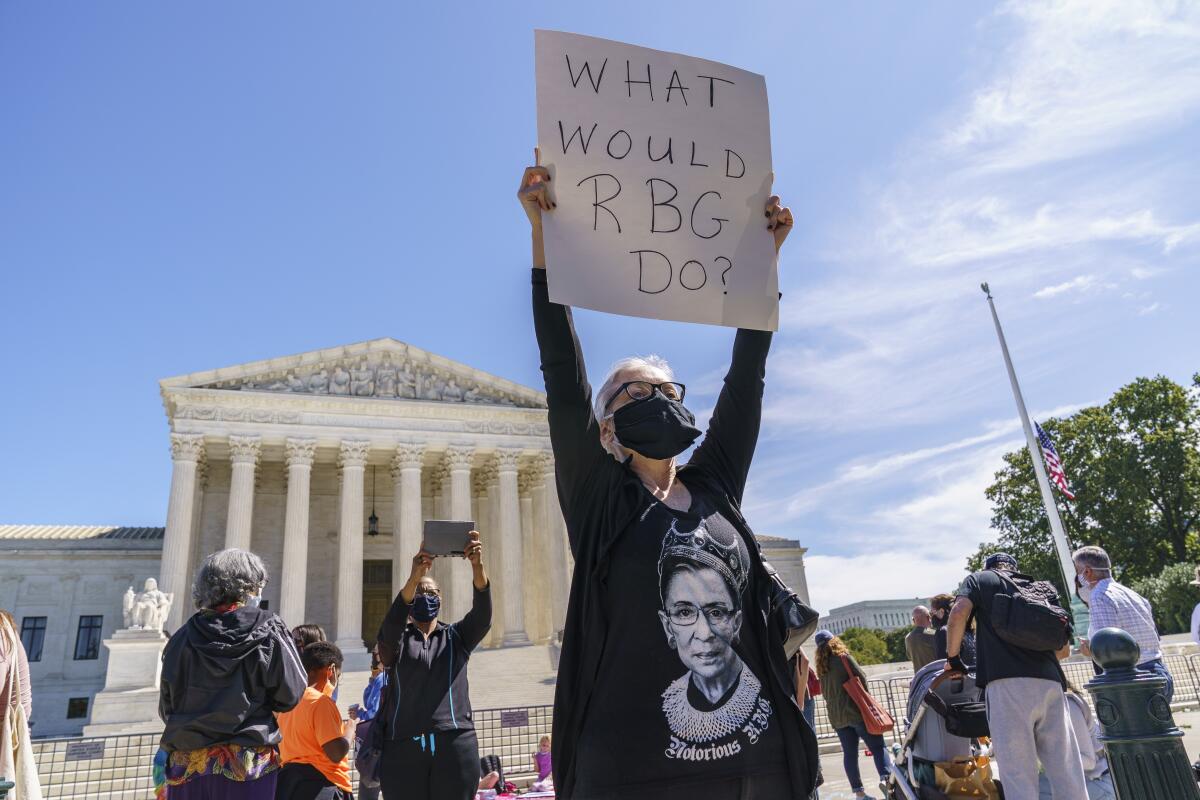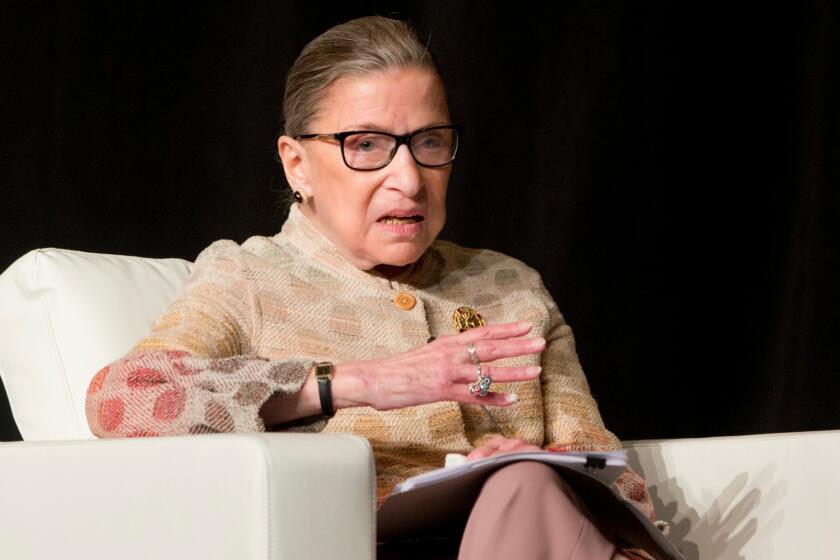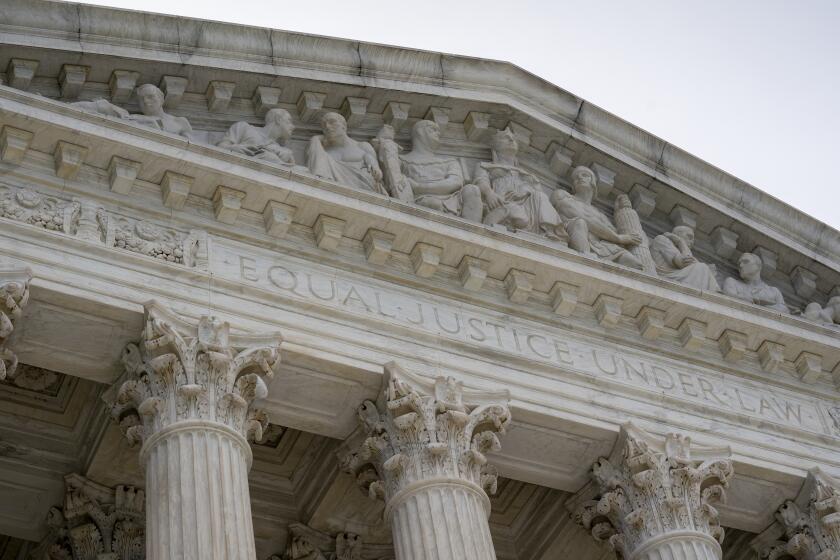Ginsburg’s death will drive voter turnout. Will it help Democrats or Republicans?

A presidential contest that had largely been a referendum on President Trump and, in particular, his handling of the COVID-19 pandemic has suddenly broadened into something more: a fight over control of the Supreme Court.
Both sides claim their base will be more energized than ever by the vacancy created with the death of liberal Justice Ruth Bader Ginsburg on Friday. The GOP has historically had more success in using the judiciary to rally its voters and push the courts to the right.
But the Democrats’ angst over losing a progressive luminary and fear of a solidifying conservative majority may be enough to turn this court opening into a political advantage.
The flood of donations to Democratic candidates after Ginsburg’s death and the impromptu vigils at the Supreme Court and across the nation indicate a liberal hunger, made more voracious after 3½ years of Trump, to stop the conservative tilt of the courts.
Whether that will be enough to overcome the well-honed political reflexes of evangelical Christians, who have been disciplined in their drive to use the courts to overturn abortion, remains to be seen. But one thing seems certain about the coming nomination fight — and the election now inextricably linked to it.
“It will be more intense than anything we’ve seen before,” predicted Michael Gerhardt, a University of North Carolina law professor who counseled the Senate Judiciary Committee on seven of the nine most recent Supreme Court confirmations.
Our Supreme Court reporter recalls the private side of Ruth Bader Ginsburg.
Even before Ginsburg’s death, there were signs that Democratic voters cared more about the courts this election. Four years ago, 70% of Trump supporters said Supreme Court appointments were a “very important” issue, compared with 62% of Hillary Clinton backers. This time, Democratic nominee Joe Biden’s supporters are 5 percentage points more likely than Trump supporters to rank court appointments as a top concern, according to polling done by the nonpartisan Pew Research Center.
That shift stems, in part, from the GOP’s recent successes in installing conservative judges at all levels of the judiciary. During Trump’s tenure, more than 200 federal judges have been confirmed and two justices have been appointed to the high court. The raft of new, younger judges will influence the judiciary for decades to come.
Until 2016, the threat of a conservative Supreme Court was never fully realized. The foundation of Roe vs. Wade, the 1973 decision that legalized abortion, has been repeatedly upheld, albeit steadily chipped away. And there were other wins, notably the legalization of same-sex marriage.
“The sky has not fallen yet,” Gerhardt said. “That led a lot of people to be complacent.”
But after Republicans refused to vote or even hold hearings for President Obama’s nomination of the moderate Merrick Garland in early March 2016, Trump has made two Supreme Court appointments — Neil M. Gorsuch and Brett M. Kavanaugh — and will more than likely fill a third seat.
“The idea of going from 5-4 [conservative majority] to 6-3 is different,” said Norman Ornstein, a political scholar at the American Enterprise Institute. Additionally, “there is still that simmering deep resentment about Merrick Garland — the sense that Republicans did not play fair.”
Veterans of past court battles say they’ve also seen new verve from Democratic politicians to take more aggressive postures about the court, such as advocating “court packing” — that is, adding Supreme Court justices to dilute the conservative majority.
Before Ginsburg’s death, “there was not a big appetite for enlarging the Supreme Court,” Ornstein said. “I think the sense was that the political ramifications were just too great, that it would unleash a huge barrage of negative pushback.”
President Trump and Senate GOP leaders plan to push to replace Justice Ruth Bader Ginsburg before the election. Can they? Can Democrats stop them?
Ornstein said he had spoken to several Democratic senators who would now be more open to the idea, particularly if Republicans ram through an appointment prior to the election or in a lame duck session if Democrats win the White House and Senate in November.
Until then, Democrats and their allies will almost certainly benefit from supporters throwing their wallets wide open this weekend.
After Ginsburg’s death was reported Friday evening, ActBlue, a major online fundraising hub for Democrats, raised $30 million in 12 hours, shattering records.
“I’ve talked to dozens and dozens of women in the last 24 hours, many of whom are not at all interested in politics, who are ready to leave the sidelines and start phone banking, door knocking and doing whatever it takes,” said Rebecca Katz, a New York-based progressive strategist.
The reason, she said, was simple: “The threat of overturning Roe is no longer hypothetical. That’s it in a nutshell.”
Privately, one Biden campaign advisor agreed, noting that the fear of abortion being outlawed is an unparalleled motivator for younger voters — especially women — who may not be enthused about the Democratic nominee “and need a reason to get fired up.”
For many younger women, the strategist said, “RBG was iconic and adored … and abortion is the one issue that people connect with the Supreme Court most of all.”
Rallying around the abortion issue has long been a playbook for the Republicans. The prospect of overturning Roe vs. Wade has held together the party’s socially conservative base, which turns out in force election after election.

The challenge for Democrats is that there is “no one litmus test,” said Nan Aron, president of Alliance for Justice, a progressive advocacy group focused on the judiciary. “Democrats care about a range of critically important issues.”
Conservatives have also built a vast network to groom up-and-coming jurists, with groups such as the Federalist Society compiling lists of potential judges so they are well-positioned when a vacancy arises.
In turn, Republican lawmakers — and especially Senate Majority Leader Mitch McConnell — have made confirming judges a top priority.
Liberals have lacked an equivalent infrastructure, and recent Democratic presidents devoted more of their political capital to major legislative lifts, such as the Affordable Care Act under Obama, than to judicial nominations, which were further obstructed by Senate Republicans.
Republicans have also united around a shared judicial philosophy of “originalism,” which promotes interpreting the Constitution according to the framers’ understanding at the time it was ratified. The theory, rejecting the handiwork of what conservatives call activist judges, has united that wing of the party since the Reagan administration.
Democrats have failed to come up with a compelling philosophical counterargument, said Georgetown law professor Victoria Nourse, choosing instead to emphasize the importance of identity and diversity in the judiciary.
“Democrats, as a group, need to come up with a countervailing theory that pushes back against a horse-and-buggy Constitution,” said Nourse, who worked for Biden when he was a senator and vice president.
When Justice Antonin Scalia, a father of originalism, died nearly nine months before the 2016 presidential election, the prospect of a Republican president filling that seat proved to be a potent motivator for evangelical voters to side with Trump, despite his multiple marriages and coarse personal style.
Those votes were crucial to Trump’s election. They made up more than a quarter of the electorate and 80% of them voted for Trump, according to exit polls. Those voters have largely stuck with Trump to this day.
Democrats could win the election and lose the Supreme Court for a generation
“I have not talked to one person who voted for the president the last time that wasn’t willing to vote for him again,” said Penny Nance, chief executive of Concerned Women for America, a conservative Christian group. “But there certainly are some people left to get, people who didn’t vote in the last election, didn’t feel energized to vote.”
She described the court vacancy as “a big shot of adrenaline to the conservative base and particularly to conservative women.”
For Democrats, the court vacancy offers the chance to highlight a range of issues, beyond abortion, that could be affected by a 6-3 conservative majority on the Supreme Court.
There could be opportunity for Democrats to further motivate Black and Latino voters, given high-stakes court battles over voting rights and immigration. Furthermore, with the court set to hear arguments in the Trump administration’s bid to overturn the Affordable Care Act, the Biden campaign was quick to emphasize the implications on healthcare, hoping to steer the conversation back to the COVID-19 pandemic, where Trump is politically vulnerable.
“As we saw in the 2018 midterms, voters across the political spectrum are mobilized more than ever because they understand what’s at stake and that the next justice who goes on the court will decide whether or not they will still have protections for preexisting conditions during a pandemic that has tragically killed nearly 200,000 Americans,” said Jamal Brown, national spokesman for the Biden campaign.
Former California Sen. Barbara Boxer, who says she feels a change in the air, speaks from firsthand experience. She was one of a record number of women elected to Congress in 1992 in a backlash after the confirmation of Justice Clarence Thomas and, in particular, the high-handed treatment Anita Hill received on Capitol Hill when she accused Thomas of sexual harassment. (It was Biden, incidentally, who ran the Judiciary Committee hearings.)
Boxer, who backs Biden, suggests a similar anger and sense of purpose will spur not just Democrats to the polls but progressive-leaning independents as well as Republican women who want to keep abortion legal.
“What does it take to fuel that kind of turnout?” Boxer said. “It goes back to emotion and caring. I think people felt that way about Anita Hill when they saw how she was treated, and they feel that way about Ruth Bader Ginsburg because they know Ruth was battling for them through thick and thin, including terrible bouts with cancer over and over again.”
More to Read
Get the L.A. Times Politics newsletter
Deeply reported insights into legislation, politics and policy from Sacramento, Washington and beyond. In your inbox three times per week.
You may occasionally receive promotional content from the Los Angeles Times.















